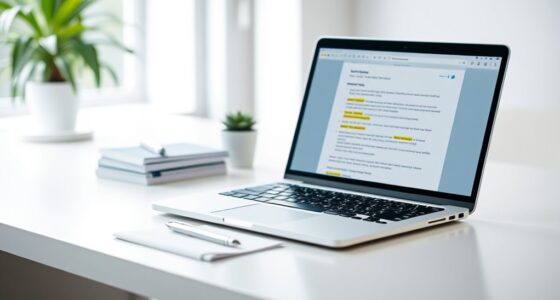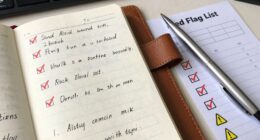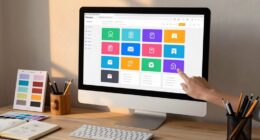To write an interview follow-up email that gets answers, start within 24-48 hours after your interview. Thank the interviewer and mention specific topics you discussed to show you were engaged. Keep your tone professional and friendly, and recap your interest in the position. Make your email concise—one or two paragraphs is enough. Avoid being pushy; instead, express your excitement and inquire about next steps. Don't forget to proofread for errors and personalize your message. If you're wondering about the finer details and examples, there's plenty more you can discover to make your email even more effective.
Key Takeaways
- Send your follow-up email within 24-48 hours to show promptness and respect for the interviewer's time.
- Personalize the email by referencing specific topics discussed during the interview to enhance memorability.
- Maintain a professional and courteous tone while expressing gratitude for the interview opportunity.
- Keep the message concise, ideally 1-2 paragraphs, and state your purpose clearly.
- Include a polite inquiry about next steps in the hiring process to encourage a response.
Introduction

In the fast-paced world of job hunting, sending a follow-up email after your interview can set you apart from other candidates. This email serves as an opportunity to express your interest in the position and thank the interviewer for their time. Ideally, you should send it within 24-48 hours to keep your conversation fresh and reflect your enthusiasm.
When crafting your follow-up email, personalization is key. Mention specific topics you discussed during the interview to demonstrate your engagement and to make a memorable connection.
Keeping your email concise—ideally 1-2 paragraphs—ensures you don't overwhelm the recipient while still conveying your appreciation and eagerness. A clear call to action can also enhance your follow-up. Politely inquire about the next steps in the hiring process, as this can prompt the interviewer to respond with valuable information.
Lastly, maintain a professional tone and ensure your email is free from errors. A well-written email not only reinforces your candidacy but also leaves a positive impression on the hiring manager, showcasing your communication skills and attention to detail.
Demonstrates Continued Interest

Showing continued interest in the position through your follow-up email is essential for making a lasting impression. In your thank you email, you should express continued interest in the role and reinforce your interest in the company. This not only demonstrates your commitment but also highlights your genuine enthusiasm for the opportunity.
Referencing specific topics discussed during the interview can make your follow-up email more memorable. It shows you were attentive and engaged, which interviewers appreciate.
Remember to keep the tone professional yet warm to foster a connection that may help you stand out in their memory.
Timing is crucial, so send a follow-up email within 24-48 hours post-interview. This shows promptness and respect for the interviewer's time, reinforcing your proactive attitude.
It's a simple yet effective way to demonstrate that you value the opportunity and are eager to contribute to the team.
Personalize Your Message

Personalizing your follow-up email can make a significant difference in how it's received. By incorporating personalization, you show that you're genuinely interested and engaged. Start by using the interviewer's name; it sets a friendly tone and demonstrates your attentiveness.
Reference specific projects or topics discussed during the interview, which not only reinforces your connection but also shows you were actively listening. Align your message with the company's culture and values. Researching these aspects allows you to craft a relevant message that resonates with the organization's priorities.
Highlight any skills or experiences that directly relate to your conversation. This not only emphasizes your fit for the role but also prompts a more thoughtful response from the interviewer.
Express appreciation for the interviewer's time and insights. Acknowledging their contributions makes your follow-up email feel more personal and genuine, fostering a sense of connection.
Step-by-Step Guide to Writing Follow-Up Emails

Crafting a follow-up email can be a straightforward process if you follow a few key steps. Start by sending your email with a clear subject line like "Thank you for the opportunity" or "Following up on my interview for [Job Title]." This sets the tone right from the beginning.
In your email, express your appreciation for the interviewer's time and refer to specific highlights from your conversation. This shows you were engaged and genuinely interested in the discussion.
Make sure to state the purpose of your follow-up email early on—whether it's to inquire about the status update of your application or to reaffirm that you remain very interested in the position.
Keep your message professional and concise, ideally limited to 1-2 paragraphs. As you conclude, include a polite call to action by asking for any updates on the hiring process or inviting them to reach out if they've additional questions.
Dos and Don'ts for Follow-Ups

After sending your follow-up email, it's important to keep in mind some key dos and don'ts to ensure you make a positive impression.
First, do personalize your follow-up email by referencing specific topics from your interview. This shows your attentiveness and continued interest in the position.
Additionally, do maintain a professional tone throughout your correspondence; this reflects your communication skills and respect for the hiring process.
On the other hand, don't send a follow-up too soon. Aim for a window of 24-48 hours post-interview to allow the interviewer time to reflect.
Also, don't make assumptions about the outcome of your interview. Instead, express your continued interest and inquire about the next steps in a neutral manner.
Examples of Follow-Up Scenarios

Many candidates encounter various scenarios after an interview that require thoughtful follow-up emails.
First, send a thank-you note within 24 hours. Express your gratitude and mention specific topics discussed during the interview. This simple gesture shows your appreciation and can leave a lasting impression, as 80% of recruiters appreciate such communication.
If you haven't received a response after a week, consider gently following up to inquire about your application status. Reiterate your interest in the job and thank them for their time and consideration.
If you've received multiple job offers, it's appropriate to inform the hiring manager while reaffirming your strong interest in their position.
After a month without communication, send a brief reminder email to check on the status of your application. Response times can vary, typically ranging from 3-4 weeks, so a post-interview follow-up email is essential.
Additionally, if there were interruptions during your interview, acknowledge them and express your willingness to provide any additional information or reschedule discussions. These scenarios can help maintain your connection and showcase your eagerness for the opportunity to join their team.
Pro Tips for Writing Effective Emails

Writing an effective follow-up email can significantly enhance your chances of making a positive impression after an interview. Start with a clear subject line like "Following Up on My Interview" to grab attention. This sets the tone and purpose right away. Writing an effective follow-up email can significantly enhance your chances of making a positive impression after an interview. Start with a clear subject line like "Following Up on My Interview" to grab attention. This sets the tone and purpose right away. In the body of the email, express gratitude for the opportunity to interview and reiterate your enthusiasm for the position. A well-crafted followup email after an interview not only shows professionalism but also helps remind the employer of your qualifications and genuine interest in the role. Ending the email with a polite call to action, such as inquiring about the next steps, further demonstrates your proactive approach.
Begin your email with a polite greeting and express your gratitude for the opportunity. This establishes a positive tone from the outset. Reference specific topics discussed during your interview to remind the interviewer of your conversation and reinforce your interest in the job.
Keep your follow-up email concise, ideally within 1-2 paragraphs. Clearly state your purpose and include any specific questions you may have about the next steps in the hiring process. This shows that you're proactive and engaged.
Final Thoughts

Sending a well-crafted follow-up email can leave a lasting impression and set you apart from other candidates. Timing is crucial, so aim to send your follow-up within 24-48 hours after the interview. This keeps your conversation fresh in the interviewer's mind and shows your genuine interest in the company.
In your email, thank someone for their time and mention specific points from your interview. This demonstrates your engagement and can spark a connection.
Don't hesitate to include questions to ask, such as inquiring about the next steps or requesting an update on your application. A direct call to action can encourage a response, making it easier for the recipient to let you know where you stand.
However, be mindful of common scenarios; excessive follow-ups can come off as pushy. Respect the timeline given by the interviewer to maintain professionalism.
Ultimately, a positive and courteous tone throughout your follow-up email fosters goodwill. It can significantly increase your chances of receiving a response, helping you stay in touch and keep your candidacy alive.
Frequently Asked Questions
How to Write a Follow-Up Email for Interview Results?
To write a follow-up email for interview results, you should send it within a week of your interview.
Start with a polite greeting and thank the interviewer for the opportunity.
Clearly state that you're inquiring about your application status or any updates.
Keep your message brief, focusing on key points that highlight your qualifications.
Conclude by inviting them to reach out if they need more information, and include your contact details for convenience.
How Do You Politely Ask for an Interview Result?
To politely ask for an interview result, wait at least a week after the interview.
Start your email with a thank-you note, expressing your gratitude for the opportunity.
Then, state your interest in the position and kindly ask for an update on your application status.
Maintain a professional tone and avoid making assumptions about the timeline.
How Do You Follow up on an Interview Response?
To follow up on an interview response, send your email within 24-48 hours.
Start with a clear subject line to grab attention. Express your gratitude for the opportunity and briefly restate your interest in the position.
Politely inquire about any updates regarding the hiring process. Keep it concise—1-2 paragraphs should do—so you respect their time.
If you haven't heard back in a week or two, consider sending a gentle reminder.
How Do You Ask if You're Still Being Considered for a Job?
To ask if you're still being considered for a job, send a follow-up email about a week after your interview.
Start with a polite greeting and thank them for the opportunity.
Clearly state your purpose by asking for an update on the hiring process, and express your enthusiasm for the role.
Mention something specific from your interview to jog their memory, then close with an offer to provide any further information they might need.









